
In 2024, Audiovisual Integration Incorporating Audio Waveform and Creative Animation Into DaVinci Resolve

“Audiovisual Integration: Incorporating Audio Waveform and Creative Animation Into DaVinci Resolve”
The amplitude and duration of an audio waveform vary with the duration and volume of the underlying sound. Finding specific edit locations when editing footage or keyframing effects is made simpler by these characteristics. Audio waveforms in Final Cut Pro alter based on the volume of a clip or any applied effects. When the volume is high, the waveform is larger; when the volume is low, it is smaller. But when using FCP to edit video, people frequently experience issues with audio waveform disappearing. Or you do want to add some dynamic effects for audio waves? Continue reading!
Part 1. How to show Audio Waveform on clips in FCP?
When working with audio waveforms on the timeline, you can zoom in or out, or change the appearance of the clip to make the waveform taller or shorter.
There are numerous methods to examine and interact with the audio and video contained within clips in Final Cut Pro. You can:
- Expand a clip to see and modify audio elements at the channel level
- Expand a clip to view separate audio and video
- Separate audio from video clip to work with audio and video as separate, independent clips
- Change the appearance of the clipped background to display reference waveforms that make it easier to view audio waveforms when the volume is reduced
The reference curve shows the maximum visual resolution possible for the current sound curve. By accounting for changes in volume, the reference waveforms allow you to see the details of the sound more clearly.
- Choose Final Cut Pro > Preferences, then click Edit.
- Check the “Show reference waveforms” box.
When the actual curve changes shape (for example, when it shrinks because the clip’s volume level is low), its full reference curve is still visible for easy reference when editing.

Tips: You can click the shortcut “Control+Option+1” to adjust the clip appearance setting to display clips on the timeline with large audio waveforms only.
Part 2. How to add audio waveform animation in FCP? (2 ways)
1. Use Pixel Film Studios Audio Visualizer
With FCPX Audio Visualizer Volume 2 from Pixel Film Studios, users now have the ability to see up to 48 audio frequencies with full control over their left and right audio output, all within Final Cut Pro. Users have full control over smoothness, base scale, radius, angular offset, camera position, and animation, all with a single click of the mouse, all in Final Cut Pro X.
FCPX Audio Visualizer Volume 2 has been professionally designed to work seamlessly inside Final Cut Pro X. As a title effect, FCPX Audio Visualizer Volume 2 can be dragged onto media and previewed in real-time. With the published parameters found in the FCPX inspector, users have the ability to make further adjustments with just a few clicks of the mouse.
With the FCPX Audio Visualizer Volume 2 preset pack, users have the ability to compose multiple presets and create their own visualizer every time. Users can choose from template layouts ranging from circles, lines, rectangles, and individual shapes to even an animatable drag zone. Then, within Final Cut Pro, users have total control over spread, color, location, rotation, angle, angle offset, and much more.
2. Use audio waveform animation templates
It could be more convenient to select a few relevant templates directly than using other plugins. You get a full set of 21 templates, including titles, fonts, media streaming logos, sound effects, and colors, with this set of Waveform Audio Visualization by Motion Array themes. You only need to pick the style you prefer, add your music, and post it with ease on your social media sites. This template is best suited for audiobooks, podcasts, and music videos. Of course, you must subscribe to the platform to download it.
Part 3. The best alternative to add audio waveform animation to video?
Create Audio WaveformVideo in Filmora Audio Visualizer
To add audio waveform animation to video, there is a wide variety of applications. However, Filmora video editor is one of the greatest programs we suggest because you can alter any sound effects on this platform with only one touch. With audio keyframing and an integrated equalization, Filmora can produce unusual sound effects that enhance the audio recording.
Under “Effects” tab, you can find 25 types of audio animation in Audio Visualizer.

Or you can directly open “Elements > Recommended”, and type “audio visualizer” or “music pack” to choose preset waveform animation elements.
Click the Play button in the Preview window and when you feel good about the results, click Export to download the video and your library and successfully share it on various social media platforms.
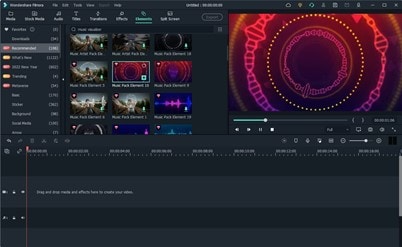
Conclusion
Social media content creators, musicians, and VJs can produce stunning videos with any of the music visualizers we’ve listed in this article. As a professional video editing software, although Final Cut Pro can provide powerful editing features, the operation is more cumbersome and not easy to get started. So, I will recommend using Wondershare Filmora for the best experience.
Free Download For Win 7 or later(64-bit)
Free Download For macOS 10.14 or later
2. Use audio waveform animation templates
It could be more convenient to select a few relevant templates directly than using other plugins. You get a full set of 21 templates, including titles, fonts, media streaming logos, sound effects, and colors, with this set of Waveform Audio Visualization by Motion Array themes. You only need to pick the style you prefer, add your music, and post it with ease on your social media sites. This template is best suited for audiobooks, podcasts, and music videos. Of course, you must subscribe to the platform to download it.
Part 3. The best alternative to add audio waveform animation to video?
Create Audio WaveformVideo in Filmora Audio Visualizer
To add audio waveform animation to video, there is a wide variety of applications. However, Filmora video editor is one of the greatest programs we suggest because you can alter any sound effects on this platform with only one touch. With audio keyframing and an integrated equalization, Filmora can produce unusual sound effects that enhance the audio recording.
Under “Effects” tab, you can find 25 types of audio animation in Audio Visualizer.

Or you can directly open “Elements > Recommended”, and type “audio visualizer” or “music pack” to choose preset waveform animation elements.
Click the Play button in the Preview window and when you feel good about the results, click Export to download the video and your library and successfully share it on various social media platforms.

Conclusion
Social media content creators, musicians, and VJs can produce stunning videos with any of the music visualizers we’ve listed in this article. As a professional video editing software, although Final Cut Pro can provide powerful editing features, the operation is more cumbersome and not easy to get started. So, I will recommend using Wondershare Filmora for the best experience.
Free Download For Win 7 or later(64-bit)
Free Download For macOS 10.14 or later
Perfect Pitch with Autotune: Installation Tutorial for Audacity Enthusiasts
You might be surprised to learn that audacity’s many default audio effects do not include an autotune feature if you have ever had to correct a song’s pitch or tuning. Not to worry!. GSnap is a free plugin that lets you use autotune (not to be confused with Auto-Tune) in audacity. On Windows, Mac OS X, and Linux computers, you can autotune and adjust the pitch of recorded files using GSnap.
This article will guide you to download the audacity autotune plugin to your computer and install it. Then you will be able to adjust the pitch of your sounds easily and tune them automatically without any hassle. This is a free download that can be installed in audacity to help you fine-tune your live vocal performance. During vocal pitch correction, it allows audacity to expand its functionality.
How Does Auto-tune Works?
Negative feedback from listeners is a common occurrence for singers. They need to satisfy their audience by giving them their most perfect production numbers. Nevertheless, there are instances when they need the aid of a device to conceal their mistakes or avoid making them. So they lip-sync and autotune their prerecorded songs.
Singers and music producers are not the only ones to use autotune. The most common users are ordinary people who have made music creation a part of their lives. Then how does autotuning operate?
The pitch is raised to the nearest correct tone when a person sings with the key off (out-of-tune). Moreover, the distortion can mask the out-of-tune parts (especially the highest and lowest pitches) in the overall performance.
How To Add Autotune To Audacity Using GSnap?
The autotune effect in audacity is enabled by the GSnap plugin (from GVST). This might be useful for correcting your pitch or creating a robotic voice. You can download it for free and install it on your computer.
You need to follow the steps to get a free autotune for audacity. Be sure to follow every step to avoid any issues.
Step 1
Find GVST - GSnap by searching Google. You can find information about GVST on the official website.
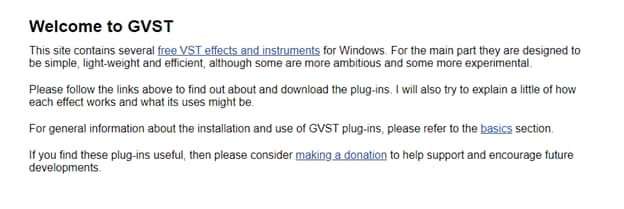
Step 2
The downloads section can be found at the top of the page. When you click it, you will be taken to the Downloads page.
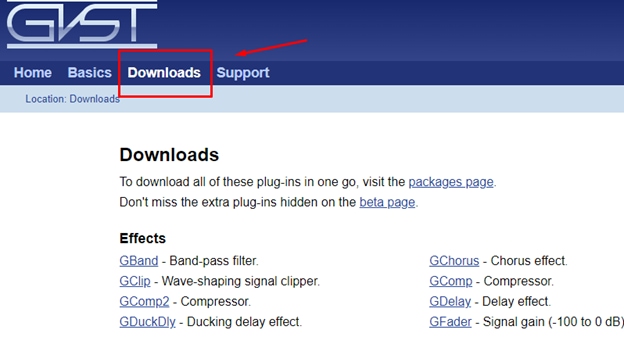
Step 3
Find GSnap from the list of downloads and click on it. A new page will open to find a GSnap download link. Once you click on it, a zip file will be downloaded to your pc. Keep in mind that this download will only work for windows. For mac and Linux, there will be a separate download link.
Step 4
Open the downloaded zip file and extract all files in it.
Step 5
There will be two files present in the folder once you have extracted them. Copy the .dll file to the Audacity plugin directory. Find the Audacity folder in the Program Files folder on your computer. Paste your copied file into the plugins subfolder. Your plugins will be added.
If you are using macOS, then open the Applications folder, right-click audacity’s icon, and choose “Show Package Contents.” Next, open the folders “Contents” and “Extensions.”
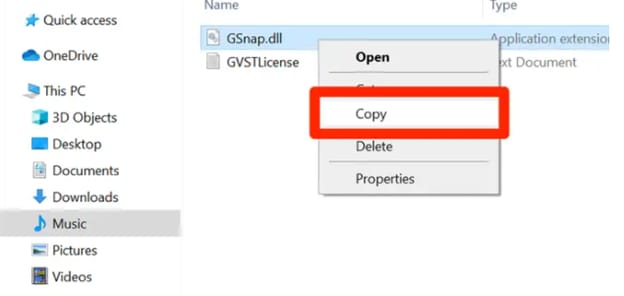
Step 6
In some cases, you may be asked for the administrator’s permission. All you need to do is click on the “Continue Anyway” button if a dialogue box appears and wait for any undergoing process to complete.
Step 7
Now run the audacity program, and if it is already running, you may need to restart it to recognize the autotune audacity plugin.
Step 8
Try recording a new sound in audacity, or you can also open an existing one from your system.
Step 9
Choose the Add / Remove plugins option from the Effects menu in the menu bar. You can enable GSnap by scrolling down and clicking on Enable. Click OK to continue.
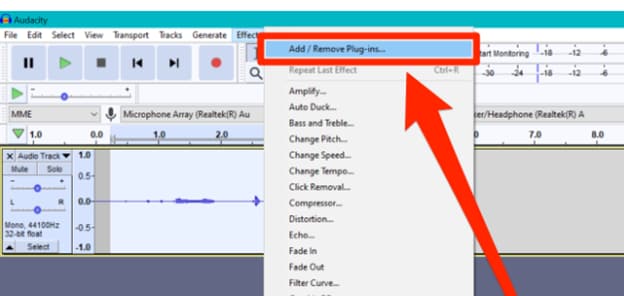
Step 10
GSnap will appear as an effective option under the “Effect” tab in audacity with the new update. Clicking on it will open a window that allows you to tune your audio file automatically.
GSnap has several options and knobs that can be used individually to autotune audio files. Get more information on GSnap’s online manual or by experimenting with the options.
Final Verdict
There is no doubt that autotune feature is a necessity of sound producers these days. Although it isn’t present in audacity, which is the most widely used tool for audio editing but using GSnap, you can get auto tune for audacity now. It is free to download, and in this article, we showed you how you could easily add it to audacity in just a few simple steps.
For Win 7 or later (64-bit)
For macOS 10.12 or later
Step 2
The downloads section can be found at the top of the page. When you click it, you will be taken to the Downloads page.

Step 3
Find GSnap from the list of downloads and click on it. A new page will open to find a GSnap download link. Once you click on it, a zip file will be downloaded to your pc. Keep in mind that this download will only work for windows. For mac and Linux, there will be a separate download link.
Step 4
Open the downloaded zip file and extract all files in it.
Step 5
There will be two files present in the folder once you have extracted them. Copy the .dll file to the Audacity plugin directory. Find the Audacity folder in the Program Files folder on your computer. Paste your copied file into the plugins subfolder. Your plugins will be added.
If you are using macOS, then open the Applications folder, right-click audacity’s icon, and choose “Show Package Contents.” Next, open the folders “Contents” and “Extensions.”

Step 6
In some cases, you may be asked for the administrator’s permission. All you need to do is click on the “Continue Anyway” button if a dialogue box appears and wait for any undergoing process to complete.
Step 7
Now run the audacity program, and if it is already running, you may need to restart it to recognize the autotune audacity plugin.
Step 8
Try recording a new sound in audacity, or you can also open an existing one from your system.
Step 9
Choose the Add / Remove plugins option from the Effects menu in the menu bar. You can enable GSnap by scrolling down and clicking on Enable. Click OK to continue.

Step 10
GSnap will appear as an effective option under the “Effect” tab in audacity with the new update. Clicking on it will open a window that allows you to tune your audio file automatically.
GSnap has several options and knobs that can be used individually to autotune audio files. Get more information on GSnap’s online manual or by experimenting with the options.
Final Verdict
There is no doubt that autotune feature is a necessity of sound producers these days. Although it isn’t present in audacity, which is the most widely used tool for audio editing but using GSnap, you can get auto tune for audacity now. It is free to download, and in this article, we showed you how you could easily add it to audacity in just a few simple steps.
For Win 7 or later (64-bit)
For macOS 10.12 or later
Step 2
The downloads section can be found at the top of the page. When you click it, you will be taken to the Downloads page.

Step 3
Find GSnap from the list of downloads and click on it. A new page will open to find a GSnap download link. Once you click on it, a zip file will be downloaded to your pc. Keep in mind that this download will only work for windows. For mac and Linux, there will be a separate download link.
Step 4
Open the downloaded zip file and extract all files in it.
Step 5
There will be two files present in the folder once you have extracted them. Copy the .dll file to the Audacity plugin directory. Find the Audacity folder in the Program Files folder on your computer. Paste your copied file into the plugins subfolder. Your plugins will be added.
If you are using macOS, then open the Applications folder, right-click audacity’s icon, and choose “Show Package Contents.” Next, open the folders “Contents” and “Extensions.”

Step 6
In some cases, you may be asked for the administrator’s permission. All you need to do is click on the “Continue Anyway” button if a dialogue box appears and wait for any undergoing process to complete.
Step 7
Now run the audacity program, and if it is already running, you may need to restart it to recognize the autotune audacity plugin.
Step 8
Try recording a new sound in audacity, or you can also open an existing one from your system.
Step 9
Choose the Add / Remove plugins option from the Effects menu in the menu bar. You can enable GSnap by scrolling down and clicking on Enable. Click OK to continue.

Step 10
GSnap will appear as an effective option under the “Effect” tab in audacity with the new update. Clicking on it will open a window that allows you to tune your audio file automatically.
GSnap has several options and knobs that can be used individually to autotune audio files. Get more information on GSnap’s online manual or by experimenting with the options.
Final Verdict
There is no doubt that autotune feature is a necessity of sound producers these days. Although it isn’t present in audacity, which is the most widely used tool for audio editing but using GSnap, you can get auto tune for audacity now. It is free to download, and in this article, we showed you how you could easily add it to audacity in just a few simple steps.
For Win 7 or later (64-bit)
For macOS 10.12 or later
Step 2
The downloads section can be found at the top of the page. When you click it, you will be taken to the Downloads page.

Step 3
Find GSnap from the list of downloads and click on it. A new page will open to find a GSnap download link. Once you click on it, a zip file will be downloaded to your pc. Keep in mind that this download will only work for windows. For mac and Linux, there will be a separate download link.
Step 4
Open the downloaded zip file and extract all files in it.
Step 5
There will be two files present in the folder once you have extracted them. Copy the .dll file to the Audacity plugin directory. Find the Audacity folder in the Program Files folder on your computer. Paste your copied file into the plugins subfolder. Your plugins will be added.
If you are using macOS, then open the Applications folder, right-click audacity’s icon, and choose “Show Package Contents.” Next, open the folders “Contents” and “Extensions.”

Step 6
In some cases, you may be asked for the administrator’s permission. All you need to do is click on the “Continue Anyway” button if a dialogue box appears and wait for any undergoing process to complete.
Step 7
Now run the audacity program, and if it is already running, you may need to restart it to recognize the autotune audacity plugin.
Step 8
Try recording a new sound in audacity, or you can also open an existing one from your system.
Step 9
Choose the Add / Remove plugins option from the Effects menu in the menu bar. You can enable GSnap by scrolling down and clicking on Enable. Click OK to continue.

Step 10
GSnap will appear as an effective option under the “Effect” tab in audacity with the new update. Clicking on it will open a window that allows you to tune your audio file automatically.
GSnap has several options and knobs that can be used individually to autotune audio files. Get more information on GSnap’s online manual or by experimenting with the options.
Final Verdict
There is no doubt that autotune feature is a necessity of sound producers these days. Although it isn’t present in audacity, which is the most widely used tool for audio editing but using GSnap, you can get auto tune for audacity now. It is free to download, and in this article, we showed you how you could easily add it to audacity in just a few simple steps.
For Win 7 or later (64-bit)
For macOS 10.12 or later
Elevate Your MP3 Experience: Practical Tips for Everyday Listening
Music lovers usually have a collection of MP3 songs. Some like to collect songs, and some like to listen to new songs, whereas some people are very much interested in simply editing MP3 songs. For doing this, a good MP3 editor is essential.
How to find a good audio MP3 editor? The article understudy will introduce an amazing audio editor along with its steps so that you get to know how to edit MP3 files. If you are ready to learn more about MP3 editing, then let’s get started without any further delay.
In this article
02 3 Popular Free MP3 Editor for Windows
Part 1 How to Edit MP3 Files?
As we have mentioned earlier, to edit MP3 files, a good audio editor is essential. Do you know any good Audio Editor? Although there are various editors, Wondershare Filmora is unbeatable. It offers a whole editing world to its users. Filmora is hands down the best software when it comes to audio editing. Its intuitive interface is easy to understand and work with that even beginners can use it.
What else does Filmora have to offer? It provides various editing elements. You name anything, and Filmora has it. The editor has a wide variety of Transitions, Effects, Filters, and other elements. Interestingly, Filmora also has a media library, Filmstock, that is full of amazing things.
Features of Filmora That Will Amaze You
As we are talking about MP3 editing so, let’s shed light on Filmora Audio Editor. The editor has some mind-blowing features that you should know.
- Audio Split is a key feature that good Audio Editors must have. Filmora lets you split audio, and additionally, you can also Trim Audio with this editor.
- A very highlighting feature that you get from Filmora Audio Editor is ‘Detach Audio from Video.’ With this feature, you can detach and remove audio from video.
- Features like Audio Denoise, Audio Mixer, Audio Equalizer are also offered by Wondershare Filmora Audio Editor.
- Ready to know a fun feature? Not only can you add Voiceover, Filmora easily replaces the original audio of the video.
For Win 7 or later (64-bit)
For macOS 10.12 or later
Step-by-Step Guideline to use Filmora Audio Editor
Are you ready to use Filmora Audio Editor, but do you know how to edit an MP3 file? Don’t worry if you have never done this before because we are about to share its step-by-step guideline.
Step 1: Importing Audio
To edit the MP3 file with Filmora Audio Editor, you firstly need to create a new project. After the project has been created, let’s import the media file. For that, go to ‘Import Media’ from the Files tab and select ‘Import Media Files.’
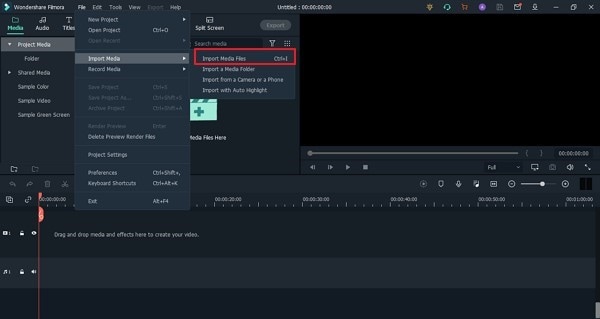
Step 2: Audio Editing Panel
Once the file has been imported, drag it onto the timeline so that you can start editing the audio. You have to double click on the audio file to open the ‘Audio Editing Panel.’
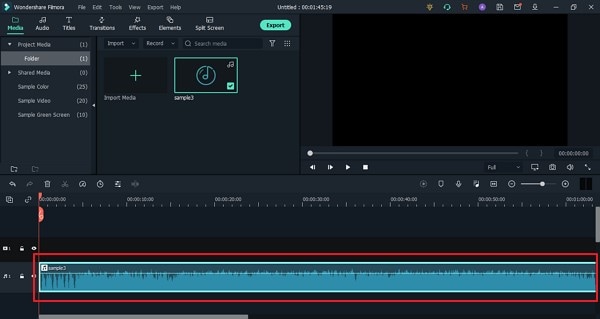
Step 3: Let’s Start Editing
With the Audio Editing Panel, you can completely edit and customize the MP3 file. It offers the ‘Fade In’ and ‘Fade Out’ options. You can also remove background noise from the ‘Denoise’ option. Moreover, you can use the Equalizer, set the Pitch, etc.
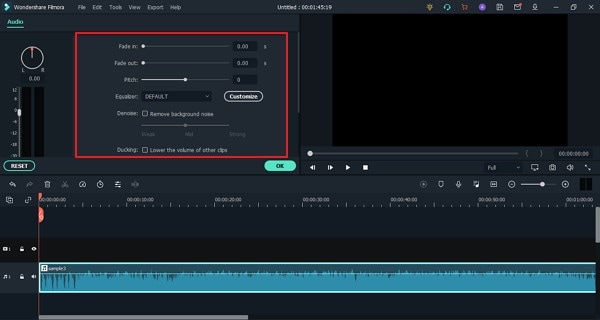
Step 4: Export the File
Lastly, once the editing is complete and you are satisfied, you can export the file. For that, hit the ‘Export’ button to open the export window. There, head over to the ‘Local’ section to select ‘MP3’ as the output format and ‘Export’ it to your device.
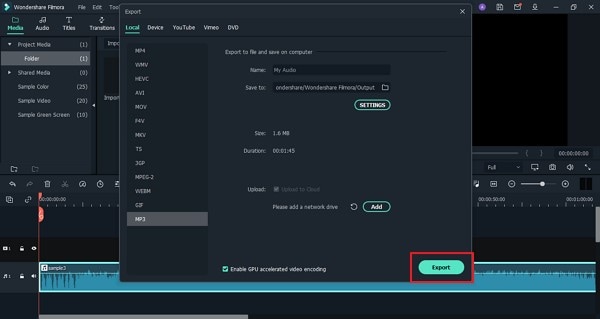
Part 2 3 Popular Free MP3 Editor for Windows
Now that we have discussed in detail Wondershare Filmora, should we talk a little about free MP3 editors? You can get a variety of free MP3 editors for Windows on the internet, but how do you know that yours is the best? If you want to know about the 3 best MP3 editors that are famous for their features, then this section is for you.
01 Audacity
Audacity is a fantastic audio editing software that is perfect for music trimming, sound effects, and dialogue. The tool offers a free version to its users. Audacity is open-source, a multi-track audio editor that makes editing easy.
The plus point for this editing software is that it supports a wide range of file formats like FLAC, WAV, MP3, and others. What attracts the users? Well, the easy and simple interface of Audacity attracts a lot of users. Another thing that matters a lot is the installation process, and in Audacity’s case, the installation is pretty easy.
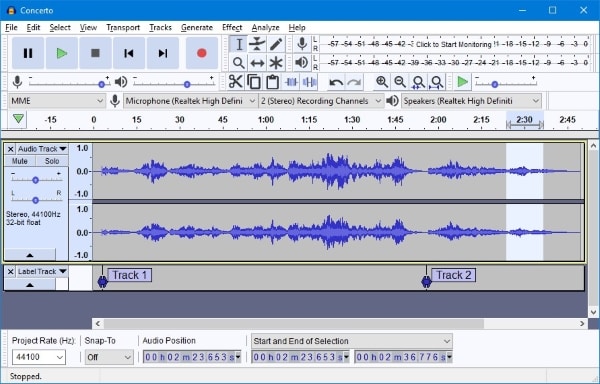
- For endless audio editing and merging audio files, nothing is better than Audacity. Also, the software supports 16-bit, 24-bit, and 32-bit sound quality.
- Audacity provides support to various plug-ins, for instance, LV2, Nyquist, VST, LADSPA, and also Audio Unit Effect.
- Another interesting thing about Audacity is that it records live audio from Mic or Mixer. You can also combine files and export them in different formats.
02 Ocenaudio
Can you name a great audio editor for home musicians and podcasters? Yes, Ocenaudio Audio Editor is the perfect, free audio editing platform for podcasters and home musicians. The audio editor has a very clear interface that everyone can use easily, without any complications. Editing MP3 files and analyzing them is made easy with Ocenaudio.
The audio editing software is famous because of its efficiency as it can edit large files. Do you want to know the fascinating thing about Ocenaudio? Well, the software uses advanced memory management, which means it opens files without wasting your PC’s memory.
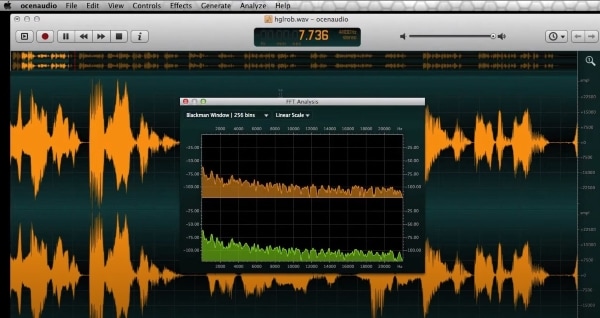
- The audio editor is the best option for everyday audio editing. Also, the software offers great filter selection with precise selection tools.
- What attracts the most users is its powerful and complete spectrogram view. Along with the waveform view, Ocenaudio also features a spectrogram view of the audio files.
- The software offers uniform features and the same graphics on all versions. Moreover, it supports various platforms like Windows, Mac OS X, and Linux.
03 WavePad Audio Editor
Are you ready to talk about WavePad Audio Editor? The software is very famous because of the wide range of features it offers. What can you do with this audio editor? Let’s start sharing!
With WavePad Audio Editor, you can edit audio by trimming, cutting, joining, splitting, etc. In addition to editing, you can also add different effects to your audio. For instance, effects like to normalize, amplify, equalize, etc. The audio editor also supports extracting audio from CDs and removing audio noise.
Do you know what else it can do? You can easily edit and export the audio file in different formats from WavePad Audio Editor.
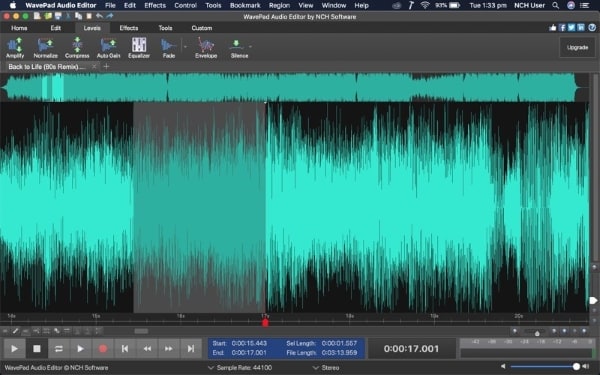
- The most amazing thing about WavePad Audio Editor is that it supports batch processing. You no longer have to wait as the software works very efficiently.
- Want to know something interesting about WavePad Audio Editor? It is compatible with different file formats and holds strong editing capabilities.
- Which audio editor can compress files? With WavePad, you can compress files with great ease and load files with just two mouse clicks.
Bottom Line
As we promised earlier that we would help you and guide you on how to edit MP3 files so, this article has everything you need. We shared how you can edit MP3 files with the best audio MP3 editor, Wondershare Filmora. Along with that, we also shared 3 popular and free audio MP3 editors.
Wondershare Filmora
Get started easily with Filmora’s powerful performance, intuitive interface, and countless effects!
Try It Free Try It Free Try It Free Learn More >

02 3 Popular Free MP3 Editor for Windows
Part 1 How to Edit MP3 Files?
As we have mentioned earlier, to edit MP3 files, a good audio editor is essential. Do you know any good Audio Editor? Although there are various editors, Wondershare Filmora is unbeatable. It offers a whole editing world to its users. Filmora is hands down the best software when it comes to audio editing. Its intuitive interface is easy to understand and work with that even beginners can use it.
What else does Filmora have to offer? It provides various editing elements. You name anything, and Filmora has it. The editor has a wide variety of Transitions, Effects, Filters, and other elements. Interestingly, Filmora also has a media library, Filmstock, that is full of amazing things.
Features of Filmora That Will Amaze You
As we are talking about MP3 editing so, let’s shed light on Filmora Audio Editor. The editor has some mind-blowing features that you should know.
- Audio Split is a key feature that good Audio Editors must have. Filmora lets you split audio, and additionally, you can also Trim Audio with this editor.
- A very highlighting feature that you get from Filmora Audio Editor is ‘Detach Audio from Video.’ With this feature, you can detach and remove audio from video.
- Features like Audio Denoise, Audio Mixer, Audio Equalizer are also offered by Wondershare Filmora Audio Editor.
- Ready to know a fun feature? Not only can you add Voiceover, Filmora easily replaces the original audio of the video.
For Win 7 or later (64-bit)
For macOS 10.12 or later
Step-by-Step Guideline to use Filmora Audio Editor
Are you ready to use Filmora Audio Editor, but do you know how to edit an MP3 file? Don’t worry if you have never done this before because we are about to share its step-by-step guideline.
Step 1: Importing Audio
To edit the MP3 file with Filmora Audio Editor, you firstly need to create a new project. After the project has been created, let’s import the media file. For that, go to ‘Import Media’ from the Files tab and select ‘Import Media Files.’

Step 2: Audio Editing Panel
Once the file has been imported, drag it onto the timeline so that you can start editing the audio. You have to double click on the audio file to open the ‘Audio Editing Panel.’

Step 3: Let’s Start Editing
With the Audio Editing Panel, you can completely edit and customize the MP3 file. It offers the ‘Fade In’ and ‘Fade Out’ options. You can also remove background noise from the ‘Denoise’ option. Moreover, you can use the Equalizer, set the Pitch, etc.

Step 4: Export the File
Lastly, once the editing is complete and you are satisfied, you can export the file. For that, hit the ‘Export’ button to open the export window. There, head over to the ‘Local’ section to select ‘MP3’ as the output format and ‘Export’ it to your device.

Part 2 3 Popular Free MP3 Editor for Windows
Now that we have discussed in detail Wondershare Filmora, should we talk a little about free MP3 editors? You can get a variety of free MP3 editors for Windows on the internet, but how do you know that yours is the best? If you want to know about the 3 best MP3 editors that are famous for their features, then this section is for you.
01 Audacity
Audacity is a fantastic audio editing software that is perfect for music trimming, sound effects, and dialogue. The tool offers a free version to its users. Audacity is open-source, a multi-track audio editor that makes editing easy.
The plus point for this editing software is that it supports a wide range of file formats like FLAC, WAV, MP3, and others. What attracts the users? Well, the easy and simple interface of Audacity attracts a lot of users. Another thing that matters a lot is the installation process, and in Audacity’s case, the installation is pretty easy.

- For endless audio editing and merging audio files, nothing is better than Audacity. Also, the software supports 16-bit, 24-bit, and 32-bit sound quality.
- Audacity provides support to various plug-ins, for instance, LV2, Nyquist, VST, LADSPA, and also Audio Unit Effect.
- Another interesting thing about Audacity is that it records live audio from Mic or Mixer. You can also combine files and export them in different formats.
02 Ocenaudio
Can you name a great audio editor for home musicians and podcasters? Yes, Ocenaudio Audio Editor is the perfect, free audio editing platform for podcasters and home musicians. The audio editor has a very clear interface that everyone can use easily, without any complications. Editing MP3 files and analyzing them is made easy with Ocenaudio.
The audio editing software is famous because of its efficiency as it can edit large files. Do you want to know the fascinating thing about Ocenaudio? Well, the software uses advanced memory management, which means it opens files without wasting your PC’s memory.

- The audio editor is the best option for everyday audio editing. Also, the software offers great filter selection with precise selection tools.
- What attracts the most users is its powerful and complete spectrogram view. Along with the waveform view, Ocenaudio also features a spectrogram view of the audio files.
- The software offers uniform features and the same graphics on all versions. Moreover, it supports various platforms like Windows, Mac OS X, and Linux.
03 WavePad Audio Editor
Are you ready to talk about WavePad Audio Editor? The software is very famous because of the wide range of features it offers. What can you do with this audio editor? Let’s start sharing!
With WavePad Audio Editor, you can edit audio by trimming, cutting, joining, splitting, etc. In addition to editing, you can also add different effects to your audio. For instance, effects like to normalize, amplify, equalize, etc. The audio editor also supports extracting audio from CDs and removing audio noise.
Do you know what else it can do? You can easily edit and export the audio file in different formats from WavePad Audio Editor.

- The most amazing thing about WavePad Audio Editor is that it supports batch processing. You no longer have to wait as the software works very efficiently.
- Want to know something interesting about WavePad Audio Editor? It is compatible with different file formats and holds strong editing capabilities.
- Which audio editor can compress files? With WavePad, you can compress files with great ease and load files with just two mouse clicks.
Bottom Line
As we promised earlier that we would help you and guide you on how to edit MP3 files so, this article has everything you need. We shared how you can edit MP3 files with the best audio MP3 editor, Wondershare Filmora. Along with that, we also shared 3 popular and free audio MP3 editors.
Wondershare Filmora
Get started easily with Filmora’s powerful performance, intuitive interface, and countless effects!
Try It Free Try It Free Try It Free Learn More >

02 3 Popular Free MP3 Editor for Windows
Part 1 How to Edit MP3 Files?
As we have mentioned earlier, to edit MP3 files, a good audio editor is essential. Do you know any good Audio Editor? Although there are various editors, Wondershare Filmora is unbeatable. It offers a whole editing world to its users. Filmora is hands down the best software when it comes to audio editing. Its intuitive interface is easy to understand and work with that even beginners can use it.
What else does Filmora have to offer? It provides various editing elements. You name anything, and Filmora has it. The editor has a wide variety of Transitions, Effects, Filters, and other elements. Interestingly, Filmora also has a media library, Filmstock, that is full of amazing things.
Features of Filmora That Will Amaze You
As we are talking about MP3 editing so, let’s shed light on Filmora Audio Editor. The editor has some mind-blowing features that you should know.
- Audio Split is a key feature that good Audio Editors must have. Filmora lets you split audio, and additionally, you can also Trim Audio with this editor.
- A very highlighting feature that you get from Filmora Audio Editor is ‘Detach Audio from Video.’ With this feature, you can detach and remove audio from video.
- Features like Audio Denoise, Audio Mixer, Audio Equalizer are also offered by Wondershare Filmora Audio Editor.
- Ready to know a fun feature? Not only can you add Voiceover, Filmora easily replaces the original audio of the video.
For Win 7 or later (64-bit)
For macOS 10.12 or later
Step-by-Step Guideline to use Filmora Audio Editor
Are you ready to use Filmora Audio Editor, but do you know how to edit an MP3 file? Don’t worry if you have never done this before because we are about to share its step-by-step guideline.
Step 1: Importing Audio
To edit the MP3 file with Filmora Audio Editor, you firstly need to create a new project. After the project has been created, let’s import the media file. For that, go to ‘Import Media’ from the Files tab and select ‘Import Media Files.’

Step 2: Audio Editing Panel
Once the file has been imported, drag it onto the timeline so that you can start editing the audio. You have to double click on the audio file to open the ‘Audio Editing Panel.’

Step 3: Let’s Start Editing
With the Audio Editing Panel, you can completely edit and customize the MP3 file. It offers the ‘Fade In’ and ‘Fade Out’ options. You can also remove background noise from the ‘Denoise’ option. Moreover, you can use the Equalizer, set the Pitch, etc.

Step 4: Export the File
Lastly, once the editing is complete and you are satisfied, you can export the file. For that, hit the ‘Export’ button to open the export window. There, head over to the ‘Local’ section to select ‘MP3’ as the output format and ‘Export’ it to your device.

Part 2 3 Popular Free MP3 Editor for Windows
Now that we have discussed in detail Wondershare Filmora, should we talk a little about free MP3 editors? You can get a variety of free MP3 editors for Windows on the internet, but how do you know that yours is the best? If you want to know about the 3 best MP3 editors that are famous for their features, then this section is for you.
01 Audacity
Audacity is a fantastic audio editing software that is perfect for music trimming, sound effects, and dialogue. The tool offers a free version to its users. Audacity is open-source, a multi-track audio editor that makes editing easy.
The plus point for this editing software is that it supports a wide range of file formats like FLAC, WAV, MP3, and others. What attracts the users? Well, the easy and simple interface of Audacity attracts a lot of users. Another thing that matters a lot is the installation process, and in Audacity’s case, the installation is pretty easy.

- For endless audio editing and merging audio files, nothing is better than Audacity. Also, the software supports 16-bit, 24-bit, and 32-bit sound quality.
- Audacity provides support to various plug-ins, for instance, LV2, Nyquist, VST, LADSPA, and also Audio Unit Effect.
- Another interesting thing about Audacity is that it records live audio from Mic or Mixer. You can also combine files and export them in different formats.
02 Ocenaudio
Can you name a great audio editor for home musicians and podcasters? Yes, Ocenaudio Audio Editor is the perfect, free audio editing platform for podcasters and home musicians. The audio editor has a very clear interface that everyone can use easily, without any complications. Editing MP3 files and analyzing them is made easy with Ocenaudio.
The audio editing software is famous because of its efficiency as it can edit large files. Do you want to know the fascinating thing about Ocenaudio? Well, the software uses advanced memory management, which means it opens files without wasting your PC’s memory.

- The audio editor is the best option for everyday audio editing. Also, the software offers great filter selection with precise selection tools.
- What attracts the most users is its powerful and complete spectrogram view. Along with the waveform view, Ocenaudio also features a spectrogram view of the audio files.
- The software offers uniform features and the same graphics on all versions. Moreover, it supports various platforms like Windows, Mac OS X, and Linux.
03 WavePad Audio Editor
Are you ready to talk about WavePad Audio Editor? The software is very famous because of the wide range of features it offers. What can you do with this audio editor? Let’s start sharing!
With WavePad Audio Editor, you can edit audio by trimming, cutting, joining, splitting, etc. In addition to editing, you can also add different effects to your audio. For instance, effects like to normalize, amplify, equalize, etc. The audio editor also supports extracting audio from CDs and removing audio noise.
Do you know what else it can do? You can easily edit and export the audio file in different formats from WavePad Audio Editor.

- The most amazing thing about WavePad Audio Editor is that it supports batch processing. You no longer have to wait as the software works very efficiently.
- Want to know something interesting about WavePad Audio Editor? It is compatible with different file formats and holds strong editing capabilities.
- Which audio editor can compress files? With WavePad, you can compress files with great ease and load files with just two mouse clicks.
Bottom Line
As we promised earlier that we would help you and guide you on how to edit MP3 files so, this article has everything you need. We shared how you can edit MP3 files with the best audio MP3 editor, Wondershare Filmora. Along with that, we also shared 3 popular and free audio MP3 editors.
Wondershare Filmora
Get started easily with Filmora’s powerful performance, intuitive interface, and countless effects!
Try It Free Try It Free Try It Free Learn More >

02 3 Popular Free MP3 Editor for Windows
Part 1 How to Edit MP3 Files?
As we have mentioned earlier, to edit MP3 files, a good audio editor is essential. Do you know any good Audio Editor? Although there are various editors, Wondershare Filmora is unbeatable. It offers a whole editing world to its users. Filmora is hands down the best software when it comes to audio editing. Its intuitive interface is easy to understand and work with that even beginners can use it.
What else does Filmora have to offer? It provides various editing elements. You name anything, and Filmora has it. The editor has a wide variety of Transitions, Effects, Filters, and other elements. Interestingly, Filmora also has a media library, Filmstock, that is full of amazing things.
Features of Filmora That Will Amaze You
As we are talking about MP3 editing so, let’s shed light on Filmora Audio Editor. The editor has some mind-blowing features that you should know.
- Audio Split is a key feature that good Audio Editors must have. Filmora lets you split audio, and additionally, you can also Trim Audio with this editor.
- A very highlighting feature that you get from Filmora Audio Editor is ‘Detach Audio from Video.’ With this feature, you can detach and remove audio from video.
- Features like Audio Denoise, Audio Mixer, Audio Equalizer are also offered by Wondershare Filmora Audio Editor.
- Ready to know a fun feature? Not only can you add Voiceover, Filmora easily replaces the original audio of the video.
For Win 7 or later (64-bit)
For macOS 10.12 or later
Step-by-Step Guideline to use Filmora Audio Editor
Are you ready to use Filmora Audio Editor, but do you know how to edit an MP3 file? Don’t worry if you have never done this before because we are about to share its step-by-step guideline.
Step 1: Importing Audio
To edit the MP3 file with Filmora Audio Editor, you firstly need to create a new project. After the project has been created, let’s import the media file. For that, go to ‘Import Media’ from the Files tab and select ‘Import Media Files.’

Step 2: Audio Editing Panel
Once the file has been imported, drag it onto the timeline so that you can start editing the audio. You have to double click on the audio file to open the ‘Audio Editing Panel.’

Step 3: Let’s Start Editing
With the Audio Editing Panel, you can completely edit and customize the MP3 file. It offers the ‘Fade In’ and ‘Fade Out’ options. You can also remove background noise from the ‘Denoise’ option. Moreover, you can use the Equalizer, set the Pitch, etc.

Step 4: Export the File
Lastly, once the editing is complete and you are satisfied, you can export the file. For that, hit the ‘Export’ button to open the export window. There, head over to the ‘Local’ section to select ‘MP3’ as the output format and ‘Export’ it to your device.

Part 2 3 Popular Free MP3 Editor for Windows
Now that we have discussed in detail Wondershare Filmora, should we talk a little about free MP3 editors? You can get a variety of free MP3 editors for Windows on the internet, but how do you know that yours is the best? If you want to know about the 3 best MP3 editors that are famous for their features, then this section is for you.
01 Audacity
Audacity is a fantastic audio editing software that is perfect for music trimming, sound effects, and dialogue. The tool offers a free version to its users. Audacity is open-source, a multi-track audio editor that makes editing easy.
The plus point for this editing software is that it supports a wide range of file formats like FLAC, WAV, MP3, and others. What attracts the users? Well, the easy and simple interface of Audacity attracts a lot of users. Another thing that matters a lot is the installation process, and in Audacity’s case, the installation is pretty easy.

- For endless audio editing and merging audio files, nothing is better than Audacity. Also, the software supports 16-bit, 24-bit, and 32-bit sound quality.
- Audacity provides support to various plug-ins, for instance, LV2, Nyquist, VST, LADSPA, and also Audio Unit Effect.
- Another interesting thing about Audacity is that it records live audio from Mic or Mixer. You can also combine files and export them in different formats.
02 Ocenaudio
Can you name a great audio editor for home musicians and podcasters? Yes, Ocenaudio Audio Editor is the perfect, free audio editing platform for podcasters and home musicians. The audio editor has a very clear interface that everyone can use easily, without any complications. Editing MP3 files and analyzing them is made easy with Ocenaudio.
The audio editing software is famous because of its efficiency as it can edit large files. Do you want to know the fascinating thing about Ocenaudio? Well, the software uses advanced memory management, which means it opens files without wasting your PC’s memory.

- The audio editor is the best option for everyday audio editing. Also, the software offers great filter selection with precise selection tools.
- What attracts the most users is its powerful and complete spectrogram view. Along with the waveform view, Ocenaudio also features a spectrogram view of the audio files.
- The software offers uniform features and the same graphics on all versions. Moreover, it supports various platforms like Windows, Mac OS X, and Linux.
03 WavePad Audio Editor
Are you ready to talk about WavePad Audio Editor? The software is very famous because of the wide range of features it offers. What can you do with this audio editor? Let’s start sharing!
With WavePad Audio Editor, you can edit audio by trimming, cutting, joining, splitting, etc. In addition to editing, you can also add different effects to your audio. For instance, effects like to normalize, amplify, equalize, etc. The audio editor also supports extracting audio from CDs and removing audio noise.
Do you know what else it can do? You can easily edit and export the audio file in different formats from WavePad Audio Editor.

- The most amazing thing about WavePad Audio Editor is that it supports batch processing. You no longer have to wait as the software works very efficiently.
- Want to know something interesting about WavePad Audio Editor? It is compatible with different file formats and holds strong editing capabilities.
- Which audio editor can compress files? With WavePad, you can compress files with great ease and load files with just two mouse clicks.
Bottom Line
As we promised earlier that we would help you and guide you on how to edit MP3 files so, this article has everything you need. We shared how you can edit MP3 files with the best audio MP3 editor, Wondershare Filmora. Along with that, we also shared 3 popular and free audio MP3 editors.
Wondershare Filmora
Get started easily with Filmora’s powerful performance, intuitive interface, and countless effects!
Try It Free Try It Free Try It Free Learn More >

Also read:
- [New] 2024 Approved GIF to Sticker Guide Mastering Conversion on Discord, WhatsApp, Telegram
- [New] In 2024, Transform Your Recordings Expert Tips for Zoom Changer
- 1. Easy Guide: Transforming Your MP4 Files Into High-Quality Xvid Video Format Using Windows
- Amplify Listener Comfort by Managing Low-Frequency Interference
- Discover the Richest Mountain Biking Audio Archives Online for 2024
- Focusing on Fine Details A Minecraft Journey
- Hands-On Crafting Unique Movie Closures for Pennies for 2024
- How to Optimize Your Setup and Enhance FPS in Dota 2 for Ultimate Performance
- How To Unlock Vivo Y36i Phone Without Password?
- New In 2024, Deconstructing the Efficacy of Sound Forge in Music Production
- New In 2024, Top 10 Iconic Song Selections for Inspiring Short Film Scenes
- Thorough Review GoPro Hero4 SLR4 Sliver Features
- Top Picks for Optimal iPhone 6 Video Format Changers
- Updated 2024 Approved Add Music to IGTV
- Updated 2024 Approved How to Mute Audio From Video
- Updated 2024 Approved The Guide to Enhancing AVI Files with Audio Tracks
- Updated In 2024, 5 Best Cellphone Tunes of the Year
- Updated Premier Android and iPhone Applications for Accurate Speech Conversion to Text
- Will MOV files play on Galaxy S21 FE 5G (2023) ?
- Title: In 2024, Audiovisual Integration Incorporating Audio Waveform and Creative Animation Into DaVinci Resolve
- Author: Paul
- Created at : 2024-10-08 08:36:08
- Updated at : 2024-10-12 09:33:43
- Link: https://voice-adjusting.techidaily.com/in-2024-audiovisual-integration-incorporating-audio-waveform-and-creative-animation-into-davinci-resolve/
- License: This work is licensed under CC BY-NC-SA 4.0.